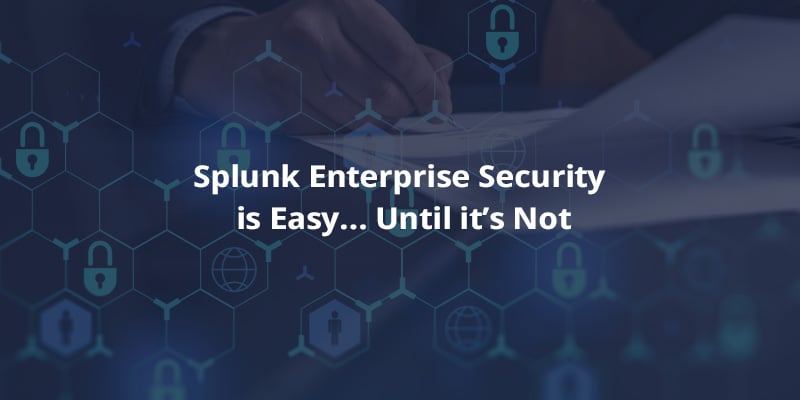Splunk Enterprise Security works great right out of the box. When set up correctly (and yep, we do that), it hums along… until things start acting weird.
Frozen data. Correlation searches that don’t work. Misinterpreted real-time data. A never-ending stream of security alerts. Missing values, which lead to misinterpretations and missed opportunities.
What do you do when you start to encounter problems? If you’ve got an in-house security analyst, then they can look into it. But they’re hard to find, hard to hire, hard to train, and really hard to keep…so you may not have someone at all. Even if you do, there’s a steep opportunity cost: every alert and issue they’re looking at means something else they’re potentially missing. Maybe something really big.
If you don’t have in-house support, you probably outsource to a Security Operations Center. And still there’s a resource cost for each glitch or alert, no matter how big or small it is.
Plenty of these problems can be solved with the right specialized know-how, which is what we bring to the table.
Splunk is a powerful platform—and a complicated security environment. Conducive seeks the simplest answers in this specialized field. For example: one common complaint is an incessant series of alerts. We investigate the alert thoroughly. If it’s not a problem, we can use event suppression so those false positives stop popping up on your screens, clogging your processes, and wasting your time. Doing that both prevents alert fatigue and notifies you of notable events that are both worth your attention and actionable.
When a real problem is detected, how hard is it to root it out? Accurate and up-to-date assets and identities allow incident response members to quickly pinpoint compromised equipment and the persons responsible for it, reducing time-to-resolution on notable event responses. Another example: our clients often come to us concerned they’re not getting what they want from correlation searches, perhaps due to Enterprise Security Content Updates (ESCUs). Our Splunk experts can tune those searches so they look in the right places—and return real answers—both by investigating the results of ESCUs and through custom creation.
Sometimes we say that pre-Splunk operations are like the horse-and-buggy days: slow and painstaking. Splunk puts you into a sports car—faster, performance-driven, with powerful acceleration. Splunk Enterprise Security? It’s a modern-day fighter jet.
You wouldn’t trust the piloting and maintenance of your jet to the farrier who specializes in shoeing horses, right?
And you wouldn’t let your car mechanic try their hand on your jet, would you?
In the same way, businesses who have chosen Splunk Enterprise Security have placed their operations into a jet-powered platform. They can’t entrust it to just anyone. It’s got to go to true experts.
But that’s not all.
What you need is a jet mechanic who knows more than simply how the plane is put together, more than just how to fix problems with a troubleshooting manual. You need a mechanic who also understands what the jet is FOR. How you’ll USE IT.
That’s just as true for Splunk Enterprise Security.
There are plenty of Splunkers out there with the right credentials, but that’s really not enough for you. You need someone who understands the business side, too.
You have plenty to concentrate on: business problems, budgets, personnel challenges, and so on. You don’t have time to explain it to the Splunkers. And you definitely don’t have time to listen to their tech speak and then try to translate it into something that makes sense to you and your organization in the real business world.
We understand the business part, too. We understand how to apply Splunk to your business problems. We also know how the details of your business use cases determine how you employ Splunk.
Sound interesting? Let’s talk.
November 30, 2022



